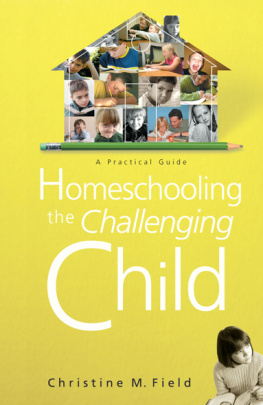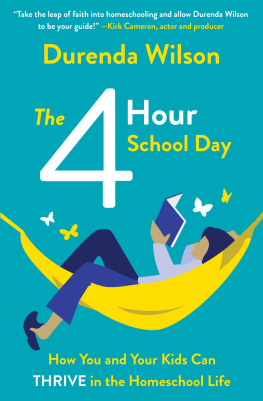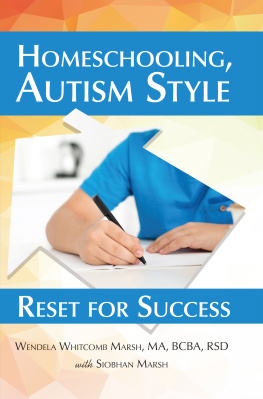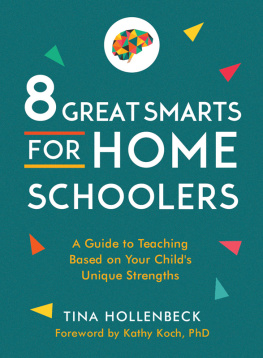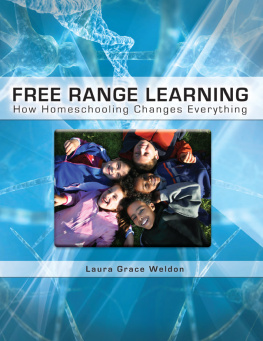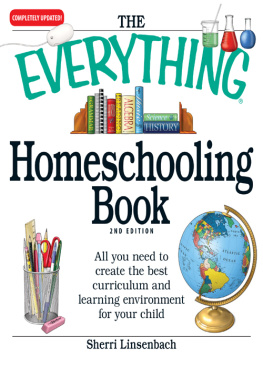Copyright 2002 by Rebecca Kochenderfer and Elizabeth Kanna
All rights reserved.
Hachette Book Group, 237 Park Avenue, New York, NY 10017
Visit our Web site at www.HachetteBookGroup.com
First eBook Edition: July 2002
ISBN: 978-0-446-55695-8
The Warner Books name and logo are trademarks of Hachette Book Group, Inc.
E2-20190114-JV-PC-AMZ
CAN YOU IMAGINE A SCHOOL MISSION STATEMENT THAT PROMISED THE FOLLOWING?
Each childs readiness will be considered before he or she begins an area of learning.
Each child will be encouraged to follow his or her interests.
Each child will learn by doing.
Each child will be honored as an individual.
Each child will have downtime to play and just be a kid.
Each child will be encouraged to pursue his or her passions in life.
Each childs special genius will be discovered, nurtured, and preserved.
No one knows and loves your child the way you do. So who is better qualified than you to help them learn?
HOMESCHOOLING FOR SUCCESS
This is a splendid and valuable work in the expanding field of homeschooling, which the authors have rendered an attractive, exciting, and eminently practical adventure of the mind I congratulate them!
Joseph Chilton Pearce, author of Magical Child and Evolutions End: Claiming the Potential of Our Intelligence
This concise blend of inspiration and practical resources can guide your family to educational success... and fun too!
Linda Dobson, author of Homeschooling: The First Year
For
William, David, Christina, and Madison Kochenderfer
Michael, Randall, Madison, and McKenzie Kanna
And
The early home schooling pioneers that paved the way ...
This book could not have come to be without the incredible support we received from:
Our gifted editor, Molly Chehak, and her team at Warner Books
Our invaluable Homeschool.com team: Christopher Jaime, Sherri Smith, Patricia Malama, Jackie Grubb, and William Kochenderfer
Our mentors
Robert Kiyosaki, Kim Kiyosaki, Sharon Lechter
Also
Matthew Gollub and Linda L. Cook
And
The thousands of homeschooling families that we have had the pleasure of advising, learning from, and making a part of our lives.
I AM HONORED TO WRITE THE FOREWORD FOR this book on homeschooling, because this is a book for parents who are taking an active role in their childs education. My own success story can be attributed to such parents. I graduated from school and have done relatively well in life simply because my dad took an active role in my education and encouraged my love of learning.
My first book Rich Dad, Poor Dad is really a book about homeschooling, in the sense that it is about a parents influence on a childs overall success in life. My real dadthe man I call my poor dadwas a schoolteacher, and eventually the head of education for the state of Hawaii. When I began failing in schoolthe very system he presided overhe took a more active interest in my academic education. Similarly, my best friends fatherthe man I call my rich dadtook an active interest in my financial education. In retrospect, I realize that my report card of life has been more greatly influenced by my two dads than all the education I received in school. The combination of these two individuals involvement in my education is responsible for my success in life.
Public school was a frightening and often humiliating place for me. As a mature adult, the only recurring nightmare I have is a dream in which Im taking a test I was not prepared for, knowing I was going to fail. School for me simply meant long hours of boredom. I had very little interest in the subjects I was required to study. At PTA meetings, my parents were often told that I was slow, lacking motivation, and not applying myself. Despite these labels, I knew I was not stupid. I was simply bored and could find very little relationship between what I was studying and real life. If I were in school today, I would probably be labeled as someone with a learning disability such as ADD or ADHD. I would be the poster boy for Ritalin.
At the age of fifteen, I flunked out of high school. It was the single most painful experience in my life up to that point. As the superintendent of education for the state of Hawaii, my father was certainly less than thrilled to have his son flunking school. Word spread quickly among his colleagues, and there were a few jokes about the top educators son being a scholastic failure. I dont know if my dad was embarrassed, but if he was, he didnt show it. All he said when he came home the night I received my failing grade was Its time for your education to begin. And begin it did.
Even though my father ran the school system, he knew it could never replace the lessons taught by a childs parents. He decided to step in and take an active role in my education. He did not focus on grades, passing tests, class ranking, which college I was going to, or how high my IQ was. The first thing he focused on was restoring my love of learning, which had been badly damaged. His lessons began when he said, Learn to study because you want to learn, not because you have to pass a test. He also said, Sometimes in life, we need to learn things we may not want to learn. So before you begin studying anything, even if you do not want to study it, first find out why you want to learn whatever it is you are studying. Learning how to want to learn is more important than the grades you receive.
Although I never learned to like school, my parents intervention in my education helped me graduate. I was even awarded a congressional appointment to an academically tough military college in New York from which I graduated with a bachelor of science degree. Recently, at my thirtieth college class reunion, I caught up with old friends and reminisced about the times when we were young and looking forward to our future. It was interesting to see who had aged the most, who was still thin, who gained the most weight, who was successful, married, divorced, had kids, grandkids, and who was no longer alive. The reunion inspired me to reflect back on all of lifes successes and failures. I realized that most of my success did not come from what I learned in school, but from what I learned at home.
Today, I continue to be a poor reader, yet I read because I want to learn. I continue to be a poor writer, yet I have had four books on the Wall Street Journal best-seller list. I managed to graduate from high school in spite of the fact that nearly 50 percent of those who started with me failed along the wayand many of those had had higher SAT scores, higher grade point averages, and higher IQs than I did. Talking to my classmates at my reunion in New York helped me realize that where we are today has very little to do with how well we did in school but more to do with how well we did at home, both as children and as adults.
In closing, I will leave you with words of wisdom from both my rich dad and poor dad, words of wisdom that have helped me with my report card of life . May these words assist you in guiding your childrens education and preparing them for the world they will face as adults.
As my schoolteacher dad once said to me, Life is not about grades. Life is about lifelong learning.
Thank you for reading this very important book.
Robert Kiyosaki
I F YOU ARE READING THIS, YOU ARE AT LEAST CURIOUS about homeschooling. Perhaps youve heard how the number of homeschooling families is growing or you have met a family that homeschools. Maybe youre researching homeschooling out of desperation because of your childs school situation. Regardless of the reasons that compelled you to pick up this book, we want to share with you one important message: You
Next page

